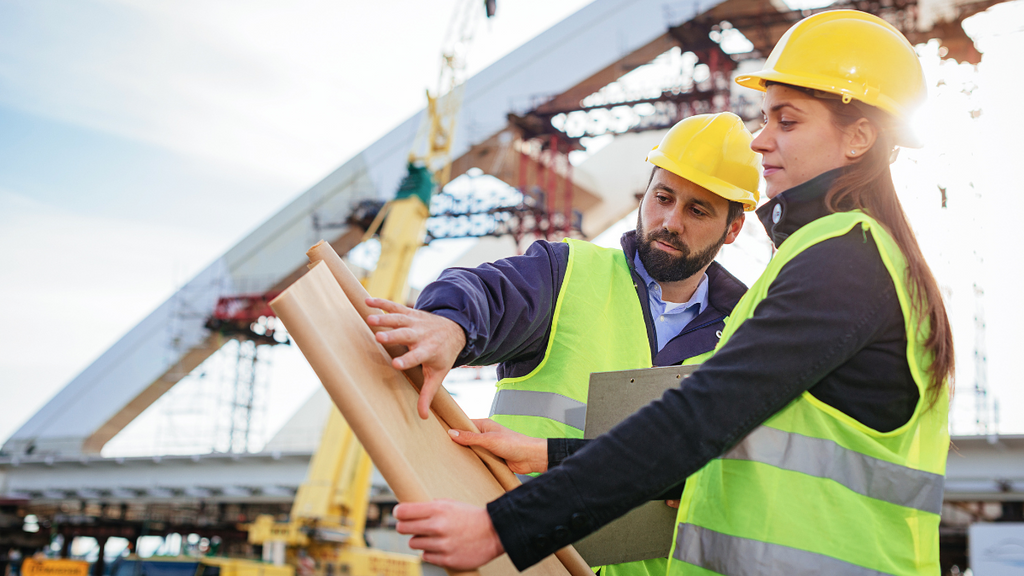The 8-Minute Rule for Geotheta
The 8-Minute Rule for Geotheta
Blog Article
The 5-Second Trick For Geotheta
Table of ContentsThe Best Guide To Geotheta4 Simple Techniques For GeothetaGeotheta Things To Know Before You Get ThisExamine This Report on GeothetaGeotheta Things To Know Before You Get This

They carry out website examinations, gather samples, do research laboratory examinations, and analyze data to review the viability of the ground for building and construction projects - Engineer of Record. Based upon their searchings for, geotechnical engineers supply suggestions for foundation style, incline stability, maintaining frameworks, and mitigation of geotechnical hazards. They work together with various other experts, such as architects, structural designers, and construction teams, to make sure that geotechnical factors to consider are integrated into the total task layout and application
By analyzing the behavior and buildings of soil and rock, they can identify potential geotechnical hazards such as landslides, dirt negotiation, or incline instability. Their proficiency aids prevent failures or mishaps that might endanger lives and home. Here are some comprehensive responsibilities and duties of a geotechnical engineer: Website Examination: Geotechnical engineers conduct website investigations to gather information on subsurface conditions.
They analyze the data to understand the residential or commercial properties and actions of the dirt and rock, including their stamina, permeability, compaction attributes, and groundwater conditions. Geotechnical Analysis and Style: Geotechnical designers assess the information accumulated during site investigations to assess the security and suitability of the site for building and construction jobs. They execute geotechnical computations and modeling to assess factors such as birthing capability, negotiation, incline stability, side earth pressures, and groundwater flow.
Not known Details About Geotheta
Foundation Layout: Geotechnical designers play a crucial duty in developing structures that can safely support the designated structure. They evaluate the soil problems and lots requirements to establish the appropriate structure kind, such as superficial structures (e.g., footings), deep foundations (e.g (https://www.indiegogo.com/individuals/37984319)., heaps), or specialized techniques like soil improvement. They think about aspects such as negotiation limits, bearing capability, and soil-structure communication to develop optimal foundation designs
They review building and construction plans, display site activities, and conduct area evaluations to verify that the design referrals are complied with. If unanticipated geotechnical problems develop, they analyze the circumstance and supply suggestions for remediation or modifications to the layout. Risk Analysis and Mitigation: Geotechnical designers analyze geotechnical dangers and risks connected with the task website, such as landslides, liquefaction, or dirt disintegration.

Collaboration and Communication: Geotechnical designers work very closely with other specialists associated with a job, such as designers, structural engineers, and building and construction teams. Reliable interaction and cooperation are vital to incorporate geotechnical factors to consider right into the total task layout and building process. Geotechnical designers give technological proficiency, answer inquiries, and make certain that geotechnical needs are satisfied.
The smart Trick of Geotheta That Nobody is Discussing
Below are some types of geotechnical designers: Foundation Engineer: Foundation engineers concentrate on developing and analyzing foundations for structures. They examine the soil conditions, tons demands, and site characteristics to figure out one of the most appropriate structure kind and style, such as shallow foundations, deep foundations, or specialized methods like stack structures.
They examine the factors influencing slope stability, such as dirt residential or commercial properties, groundwater problems, and slope geometry, and create strategies to avoid incline failings and alleviate risks. Earthquake Engineer: Quake designers concentrate on analyzing and developing frameworks to hold up against seismic pressures. They assess the seismic risk of a site, assess dirt liquefaction capacity, and establish seismic style criteria to ensure the safety and security and strength of frameworks throughout earthquakes.
They execute area screening, accumulate samples, and assess the collected information to identify the dirt residential or commercial properties, geologic formations, and groundwater conditions at a site. Geotechnical Instrumentation Engineer: Geotechnical instrumentation designers concentrate on monitoring and gauging the actions of dirt, rock, and structures. They set up and maintain instrumentation systems that check aspects such as soil settlement, groundwater degrees, incline movements, and structural variations to examine performance and provide very early warnings of potential issues.
The Main Principles Of Geotheta
They perform examinations such as triaxial examinations, consolidation examinations, straight shear examinations, and permeability tests to collect data for geotechnical evaluation and design. Geosynthetics Designer: Geosynthetics designers Find Out More focus on the design and application of geosynthetic materials, such as geotextiles, geogrids, and geomembranes. They use these materials to improve soil security, reinforce inclines, give drain options, and control disintegration.
They have a tendency to be investigatory people, which indicates they're intellectual, introspective, and analytical. They are interested, methodical, rational, logical, and sensible. Some of them are likewise social, implying they're kind, generous, cooperative, patient, caring, useful, understanding, skillful, and pleasant. Does this seem like you? Take our free occupation examination to discover if geotechnical designer is just one of your top occupation matches.
In the workplace setting, geotechnical engineers make use of specialized software program devices to do estimations, create styles, and assess information. They prepare records, evaluation task specifications, connect with clients and employee, and coordinate project tasks. The office setup provides a favorable setting for research study, evaluation, and collaboration with other experts entailed in the task.
Our Geotheta Diaries
They frequently visit job sites to perform site investigations, assess geotechnical conditions, and collect data for evaluation. These sees entail traveling to different locations, occasionally in remote or tough surfaces. Geotechnical engineers might execute soil sampling, conduct tests, and screen building tasks to ensure that the geotechnical elements of the task are being executed correctly.
Geotechnical designers additionally function in specialized geotechnical research laboratories. In these facilities, they conduct experiments, do examinations on dirt and rock examples, and examine the engineering buildings of the materials. Geotechnical lab designers work extensively in these environments, taking care of testing devices, operating tools, and taping information. They team up with other laboratory staff to make sure precise and reliable screening outcomes.
Report this page